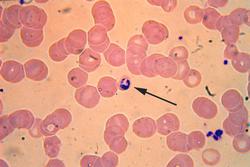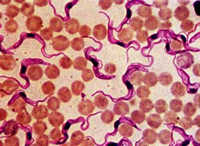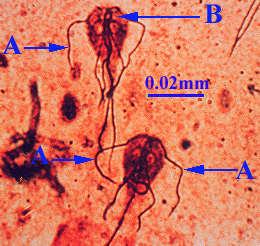Parasitic Protists
Parasite - an organism that lives on or in a host organism and causes harm to that organism
Vector - an organism that can carry a parasite, and is responsible for infecting other organisms (host) with that parasite. Vectors themselves are not harmful, but in the battle against human disease, controlling the vector can control the transmission of parasites.
Malaria
Protist: Plasmodium
Vector: Anopholes MosquitoStatistics:
- According to the World Health Organization, 300-500 million cases of malaria occur each year
- Malaria results in 1.5-2.7 million deaths per year (much more than AIDS)
- Most cases occur in Africa and South America
- Symptoms include fever, headache, vomitting and other flu-like symptoms
- The protist lives inside the bloodstrea, eventually clogging capillaries and destroying blood cells, which will lead to death if not treated
|
The arrow points to the purplish colored protist (Plasmodium), the pinkish spheres are blood cells |
Anopheles moquisto taking a blood meal, this is how a human becomes infected with plasmodium and contracts Malaria |
African Sleeping Sickness (or Trypanosomiasis)
Protist: Trypanosoma
Vector: Tse Tse Fly
Statistics:
- Occurs mostly in sub-saharan africa
- Symptoms include fever, headaches, pain in joints -followed by a phase when the parasite infects the central nervous system, causing confusion, lack of coordination, and uncontrolled sleepiness. Without treatment, the host will die
|
This slide shows a blood smear of a person infected with trypanosoma. The protist is the purplish colored string-like things. They appear string-like due to a flagella. The reddish circles are blood cells. |
Giardiasis
Protist: Giardia
Transmission: Drinking contaminated water (usually outdoor streams and other untreated water)
Symptoms: Severe diarrhea and vomitting, the protist takes up residence in the digestive tract.
|
B
= Protist, Giardia |
Other Protist Parasites
Cryptsporidium - this protist was responsible for a major health crisis in detroit when the city's drinking water became contaminated
Amebic Dysentery - also known as Montezuma's Revenge, travellers often contract this in other countries (causes diarrhea)
Questions for Thought
1. Does the United States have a responsibility toward treating and containing parasitic infections found in other parts of the world?
2. Why is controlling the vector important to control the disease?
3. One of the best ways to prevent many parasitic infections is to have a source of clean water. Why do you think many third world countries have more incidence of parasitic infection that other countries?



